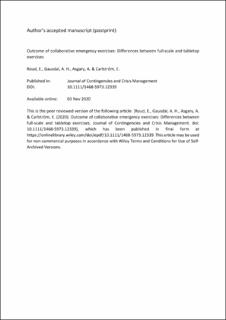Outcome of collaborative emergency exercises : Differences between full‐scale and tabletop exercises
Peer reviewed, Journal article
Accepted version

Åpne
Permanent lenke
https://hdl.handle.net/11250/2727445Utgivelsesdato
2020Metadata
Vis full innførselSamlinger
Originalversjon
Roud, E., Gausdal, A. H., Asgary, A. & Carlström, E. (2020). Outcome of collaborative emergency exercises: Differences between full‐scale and tabletop exercises. Journal of Contingencies and Crisis Management. doi: 10.1111/1468-5973.12339Sammendrag
The degree to which exercises improve the collaboration among different organizations during an emergency is under debate. This study aims to contribute to the scarce research on this topic by giving insight into the perceived effects of exercises on collaboration, learning, usefulness and interorganizational trust. In particular, this quantitative study looked into the differences between the effects of tabletop and full‐scale exercises. A questionnaire assessing collaboration, learning, usefulness and trust—the CLUT instrument—was developed. Data were collected from 173 full‐time emergency management personnel in Norway and Canada. Usefulness, learning and collaboration outcomes were perceived to be high for both types of exercises, but full‐scale exercises were perceived to have greater learning and usefulness outcomes than tabletop exercises. Stronger relationships were identified between the perceived effects on learning and usefulness, collaboration and trust in tabletop compared to full‐scale exercise, whereas the relationship between the perceived effects upon collaboration and trust was stronger in full‐scale exercises. Multiple regression analysis showed that the variables used to measure exercise usefulness can better predict tabletop exercise outcomes.